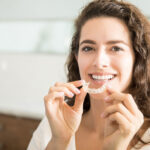Bacteria! Microorganisms! Danger, disease, sickness abound! Manufacturers use phrases like this to convince you that going “antibacterial” is the best thing for you and your family. Part of this march to a 100% sanitary environment is the encouragement to buy a UV toothbrush sanitizer. Do these devices really work and is it the only way to keep your toothbrush clean? We have answers for our Placerville dental clients.
Research on UV Sanitizers
Studies featured in various dental journals have demonstrated the ultraviolet toothbrush sanitizers work reasonably well. They do reduce the number of bacteria and organisms on your toothbrush. They do not eliminate living organisms entirely, however, because such organisms are everywhere! Some of them are harmful, many of them are not. Of those that are bad for you, a healthy immune system will generally deal with the majority of the invaders. You can be assured, however, that UV toothbrush sanitizers accomplish what they are supposed to do — they kill microorganisms with ultraviolet light.
Is This the Only Way to Clean My Toothbrush?
There are many other ways to clean your toothbrush that have also been studied by dental scientists. These include the following devices and substances:
- Microwave Ovens
- Dishwashers
- Mouthwash
- Old-fashioned Rinse and Air Dry
We will consider the efficiency of each of these methods of cleaning your toothbrush.
Kitchen Appliances
Both a microwave oven and a dishwasher do a good job of killing microorganisms. The microwave does it with radiation, the dishwasher with old school soap and hot water. While these methods work, there are two major problems:
- Your housemates may get quite disgusted to find your toothbrush inside the kitchen.
- The microwave gets your toothbrush very hot!
We don’t know if there’s a solution for the first problem. That’s up to your and your household. The second problem is dealt with by not microwaving your toothbrush for very long. Studies found that a minute, or less, was more than enough time to kill any living thing on your toothbrush bristles. Test the temperature or cool it off with tap water before putting it into your mouth!
Mouthwash
Mouthwash is supposed to kill plaque-causing bacteria in your mouth, so it naturally works on your toothbrush too. Any type of antiseptic fluid gets the job done if you rinse or soak your toothbrush for twenty minutes. With time, however, the expense of this method might make the UV sanitizer seem like a money-saver.
Rinse with Water and Air-Dry
Believe it or not, this method actually works to clean off your toothbrush. Certainly, it is not as effective as any of the methods mentioned above, but it does reduce the number of bacteria on the toothbrush. It is also very cheap. If sunlight is available, you may also get some free UV light on your brush.
Let the Buyer Beware
Ultraviolet toothbrush sanitizers come with mixed reviews as far as performance and durability. Anything that comes in contact with water tends to have a short shelf-life, and many UV sanitizers have this problem. Do some research to find out which brand on the market at any given time is the most efficient in regards to battery use and durability. Some only last a few months, others last for years. Investing in a battery recharger is also a good idea, to limit the costs of powering the unit. Finally, while many manufacturers talk about the benefits of keeping your toothbrush clean if you get sick, in order to prevent reinfection, the best thing to do after an illness may be to simply replace your toothbrush.



0 Comments